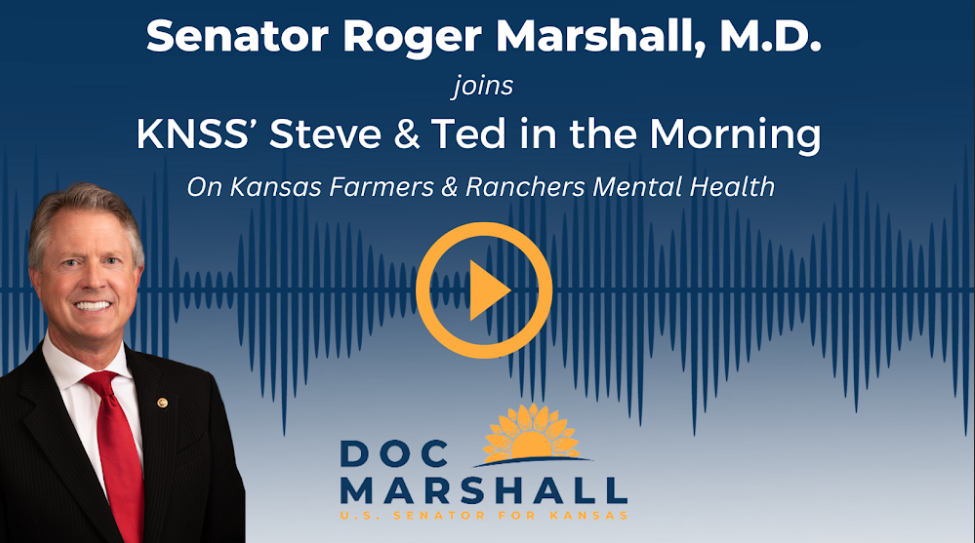ICYMI: Senator Marshall Joins KNSS To Discuss Ag Mental Health Campaign
Washington, D.C. – U.S. Senator Roger Marshall, M.D. joined KNSS’Steve & Ted in the Morning to discuss Senator Marshall’s Ag Mental Health Awareness Campaign, which is intended to bring attention to the mental health resources that are available to farmers, ranchers, and other members of rural communities. Challenges that are unique to those working in agriculture are contributing poor mental health outcomes in rural Kansas communities. Senator Marshall’s ongoing campaign is highlighting how rural Kansans can recognize a mental health crisis and where to turn for help.
If you or someone you know is experiencing a mental health crisis or contemplating suicide, 9-8-8 is the National Suicide & Crisis Hotline. The average wait time to be connected in Kansas is less than 21 seconds.

You may click HERE or on the image above to listen to Senator Marshall’s full interview.
Highlights from Senator Marshall’s interview include:
On his Ag Mental Health Awareness Campaign:
“September is National Suicide Prevention Month, my farmers and ranchers have a three and a half times suicide rate of any other profession. And a lot of that is because of the increased stressors in their life right now, between the droughts, high interest rates, high input costs, the suicide rate is very high for farmers and ranchers.”
“So we’re just trying to get the message out to be a good neighbor, to look out for those signs and symptoms of one of your friends that might be having some challenges. And you know, maybe it’s a person that’s not going to high school football games anymore, and maybe they’ve dropped out of a Sunday school class, or playing cards. Maybe they’re saying something like maybe my family would be better off without me. So we’re just trying to bring awareness to the situation, that they’re not alone, and there’s help out there, lots of help, and just want to know that they’ve got a friend in you and me.”
On Challenges Unique to Agriculture that Contribute to Rural Mental Health Problems:
“In Kansas, we plowed under about a third of our wheat crop, and that’s our big cash crop as far as agriculture goes. This drought is impacting the grasslands, especially in the Flint Hills around where I grew up, around Emporia, that area as well. So those ranchers are really feeling the stress, they’re having to take cattle and sell them before they want to, my dairy men and women can’t find feed to feed their cattle and to feed the dairy herd as well.”
“The average farmer has a million dollar operation loan. And they’re spending 9% interest today rather than 2%. So this will be the worst economic year for farmers and ranchers, I think, since the 1980s, that there’ll be very few farmers or ranchers that net any money. So they’ll be borrowing money to plant next year’s crop. So the stress is very real.”
“Our community health centers, our mental health centers are good to go. You can call 988 or text 988 if you’re worried about taking your own life, and within 30 seconds someone’s going to talk to you and they’re going to get you into somebody a professional as well, within the next several hours.”
On how the Farm Bill can Help with Rural Mental Health:
“There’s crop insurance protection, and that allows them to farm again to plant next year’s crop if they lose this one. And then there’s something, I don’t want to get too technical, but it’s called Title One funding. And that’s where they set the reference price on wheat and the particular commodities.”
“In the previous IRA [Inflation Reduction Act] bill, which passed a couple of years ago, there’s $20 billion in there for agriculture conservation. The problem is half of those conservation practices we don’t do in Kansas. I mean, they’re just impossible to do. So we’re thinking of taking some of that money in the meantime, and help the farmers and ranchers out with their reference prices.”
###
